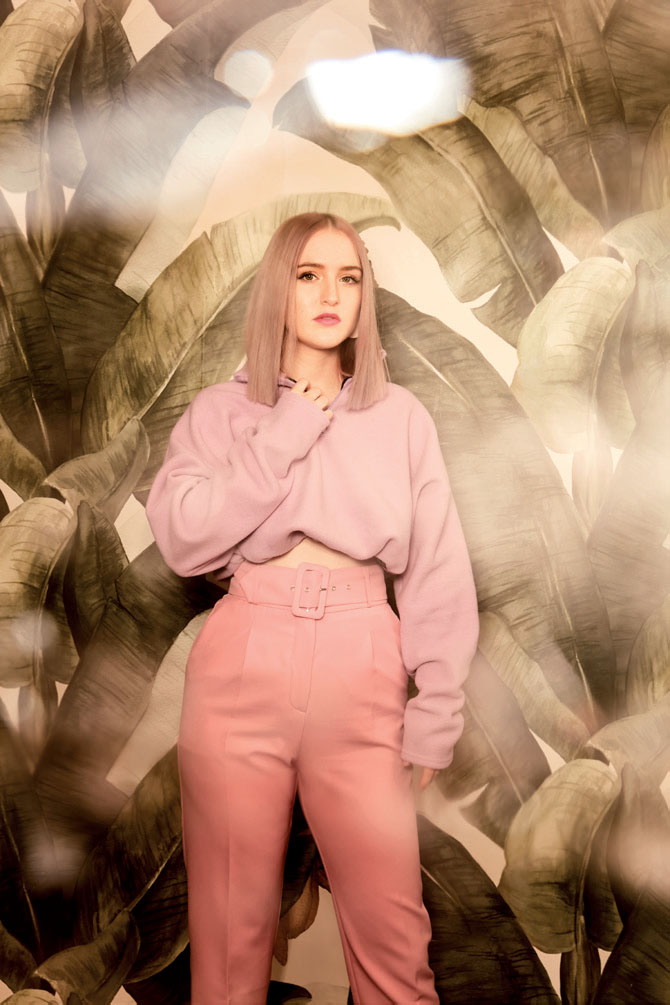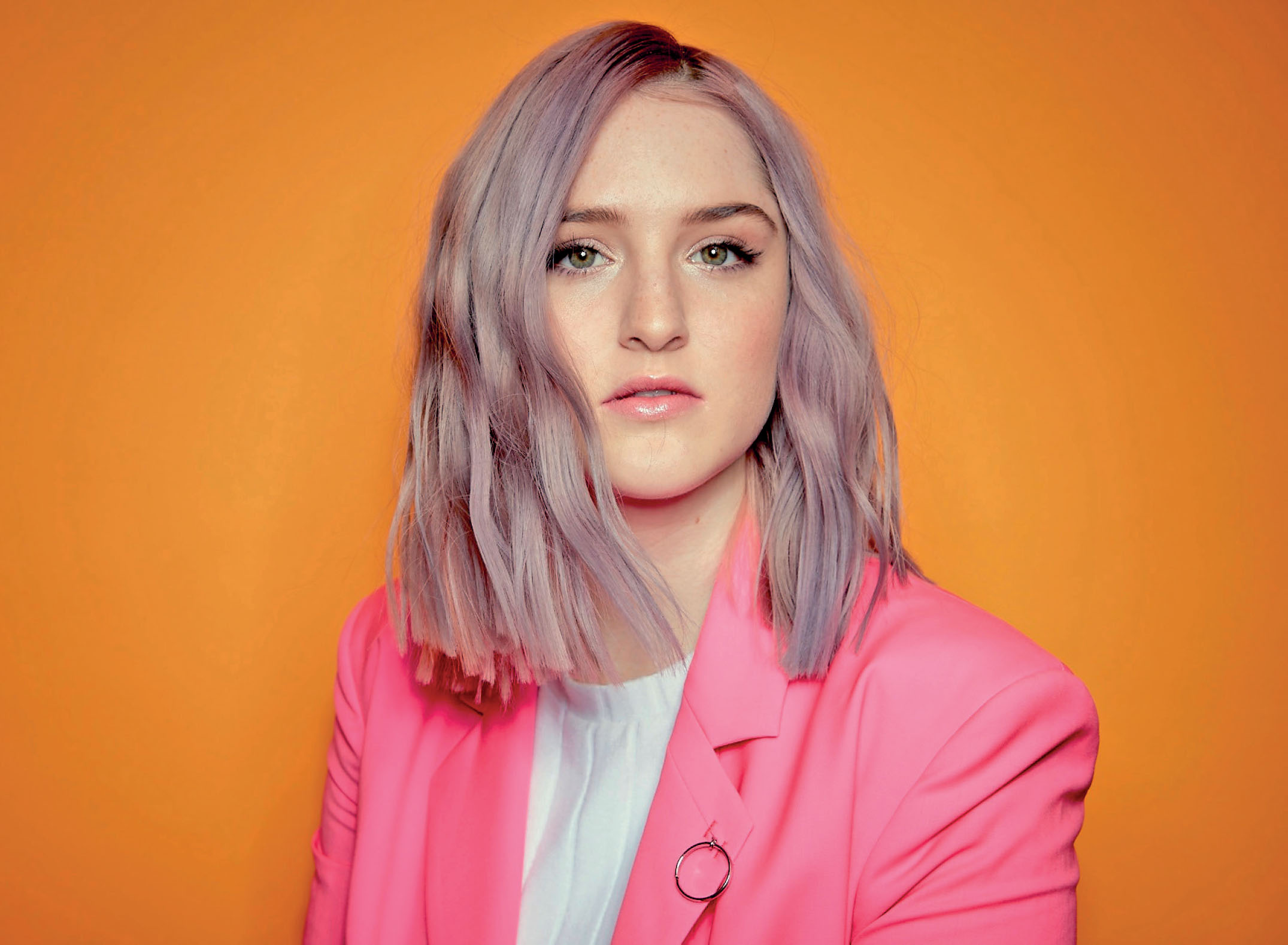
What was your introduction to music?
I was always around music when I was growing up. In terms of when I started making my own music, or even thinking that I could make my own music, it was when I was 13 and started learning the guitar. I didn't really share it with anyone, especially anyone at school, for a while and I started putting up cover videos on YouTube. I saw other people doing this and I found it quite cool that I could share music without worrying about people I knew in real life. Eventually people at school started seeing it, including a music teacher who became very supportive – they've actually helped me since I've left school, which was lovely to have.
How did you start learning guitar?
When I was in primary school, I started learning the violin in school. However, I wasn't very good at it and I didn't think that it was really for me, unfortunately! There's a place in Dundee, where I'm from, where I managed to trade my violin for a guitar, and I started doing some lessons outside of school. It wasn't until S3 [Year 10 in England and Wales; Year 11 in the north of Ireland] that I started to have lessons in school and learn more about the sort of in-depth parts, such as reading tab. Before that, I had learned the basic chords and different ways to strum, stuff like that. I was sort of making it up myself, really, until I had proper lessons in how to read and write music.
What was it about the guitar?
I think I had just seen more people playing the guitar. I was listening to people like Paolo Nutini, Tracy Chapman and Avril Lavigne – music that's pretty much driven by guitar. I started by covering their songs, and playing along with Paolo Nutini was my way into figuring out how to play and sing at the same time. I couldn't do that for a while – it's not something you really think about and then when you start, you think, ‘oh, that's tricky!’

A love of guitar-driven music inspired Be Charlotte to trade in her violin for a guitar
How did you start writing your own material?
I was about 14 when I wrote my first song. There wasn't a moment when I made a decision to start writing songs. I just started to mess around with chords that I knew and tried to put my own words on top of it. I had written down thoughts I had been having and just had the idea to put them to music. I loved the process of doing that and, at that time, I would write songs when I felt like it, or when I had something to say or get off my chest that I didn't feel able to say in real life.
Is that still how you approach songwriting?
Definitely! It's a bit different now though, because I'm going into songwriting sessions with other people and you need to get the song written that day. It's a lot of pressure but I find it helpful because when I was just writing alone, which I still do, it would take me forever to finish a song. It's hard to know when it's done and collaboration can really help you separate the good ideas from the bad.
You're an alumnus of Hit the Road, which we covered in March. What was your experience like?
It was great. I was 16 and it was the first time that I had done a tour. There was a good bunch of us, all about the same age, and it was the best experience that I'd had at the time. It allowed me to get out of Dundee and meet other people that were making music. I loved it. It was a vital experience for me and I'm so glad that it's still happening.
So you were performing original material as a teenager – how did that go?
It was scary. Being under 18, I couldn't play in a lot of venues. Sometimes, I would go to an open mic and be told afterwards that I couldn't come back again. It was frustrating at the time because I wasn't there to do anything dodgy, I just wanted to play! Now I'm older, I understand why the venues have to be like that, but it made it a struggle. It all helped me build my confidence though.
What would you say to young musicians who want to start doing what you do?
My best advice is to really spend the time to figure out who you want to be as an artist, be that a songwriter or performer, and stick to that vision. Don't let too many people put you off the idea of being yourself. I find that some people find it easier to conform but I think it's good to develop that sense of self and maintain it. Of course, it's good to have advice but I always feel that if it feels good to you, and you think it's the right thing to do for you, then it pretty much is.
On that note, I noticed that you sing with your Scottish accent – was that a conscious decision?
Absolutely. When I started, I didn't sing in my own accent. I would sing in that generic singer-songwriter voice. It took me a while to become confident enough. I eventually got there by adding in spoken word parts into my songs and then I gradually realised that I could just sing it instead of saying it. That gave me more confidence and is something that I would never change. I can sympathise with other people and how difficult it can be to get there. There's this sense that it's necessary for everyone to sound the same but I enjoy it more when you can tell it's someone's real voice coming through. I love that it gives you more textures and rhymes to work with – though sometimes when I'm doing songwriting sessions in places like Germany, Sweden and America it can make things more difficult! This year, I realised how much easier I could make my life if I just went back to that generic voice but it's the challenges that keep me writing.
What prompted your Scottish schools tour?
I had wanted to do it for a long time, to be honest. When I was at school I was so unconfident in myself as a person and my music. I was lucky enough to have that one teacher who was really supportive but apart from that I was quite alone with it at school and I didn't have an understanding of what a career in music could look like.
Last year, we did a trial run of it. We had a lot of chats about the different types of careers that you can have in music, not just performing but all the stuff that goes on behind the scenes. I talked about why I was writing these songs and what they were about, the sorts of issues I faced such as bullying. I wanted more young people to think about a career in music and to know that there are other options out there – you shouldn't feel forced to do anything. When I left school, I knew I wanted to do music but it seemed so impossible. I think there's a lack of women across the music industry and I think it comes from not having that confidence when you're younger – I wanted to inspire young girls to keep going with music and to know that it's something that they can do, it's not just for boys.

Role model: Be Charlotte hopes ‘to inspire young girls to keep going with music’
With the tour, I also wanted to put a real face on the music industry. A lot of time, people sign a record deal and are then perceived as successful and I wanted to make that process transparent. I wanted to show young people how I've done it and that they can do it as well – I'm just a normal person, like them. We did another tour this year in Scotland but I'm hoping that we can take it to the rest of the UK!
A lot of comments on the video for your single ‘Do Not Disturb’ are from kids who are excited that you came to their school – that must feel nice?
Yes, it's really lovely. While it's obviously great for me to have that interaction on social media, what I want is for young people to hear my music because they can't go to a lot of gigs, for the reasons I mentioned earlier. In Scotland, I always try to make sure my shows are open to the over-14s but not a lot of venues are happy to do that. I wanted to bring a little bit of a gig experience to them instead so that they can say they have seen one. Hopefully when I can do those types of shows, they then feel able to come along as well. I want to do more of them throughout the country.
I think that a tour of schools is something that any artist could do, to be honest and it would be great if more of them could see that it's doable. After all, it's just me and my manager trying to do it as cheaply as possible and trying to visit as many schools as we can! To be able to do it all over the UK though would be amazing.
For more information about Be Charlotte, including contact details to enquire about the UK school tour, please visit iambecharlotte.com. The website also contains links to listen to ‘Do Not Disturb’, and the video can be watched here: tinyurl.com/mt6-BCdnd








